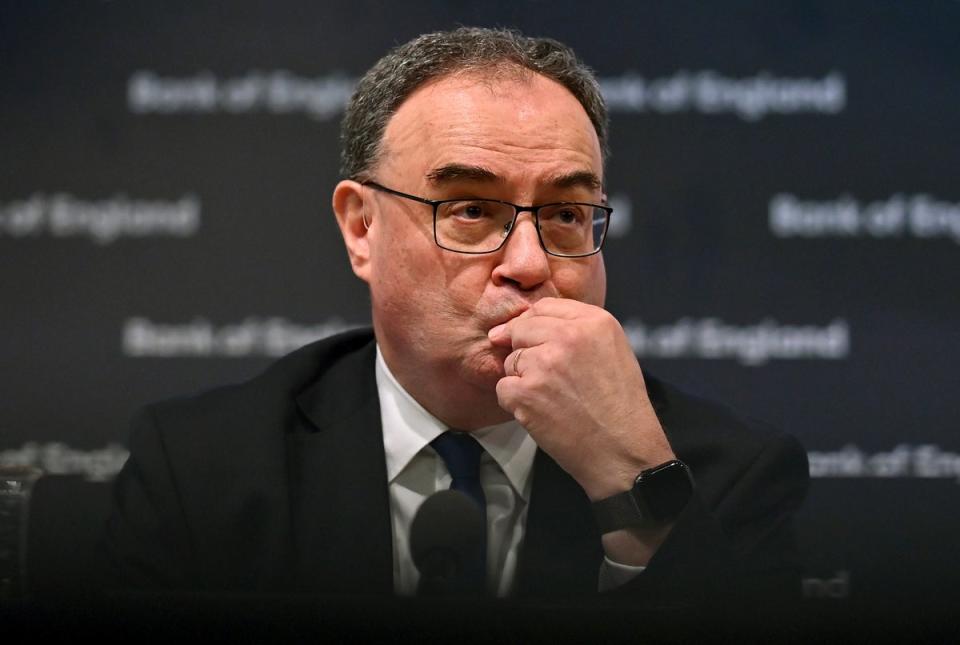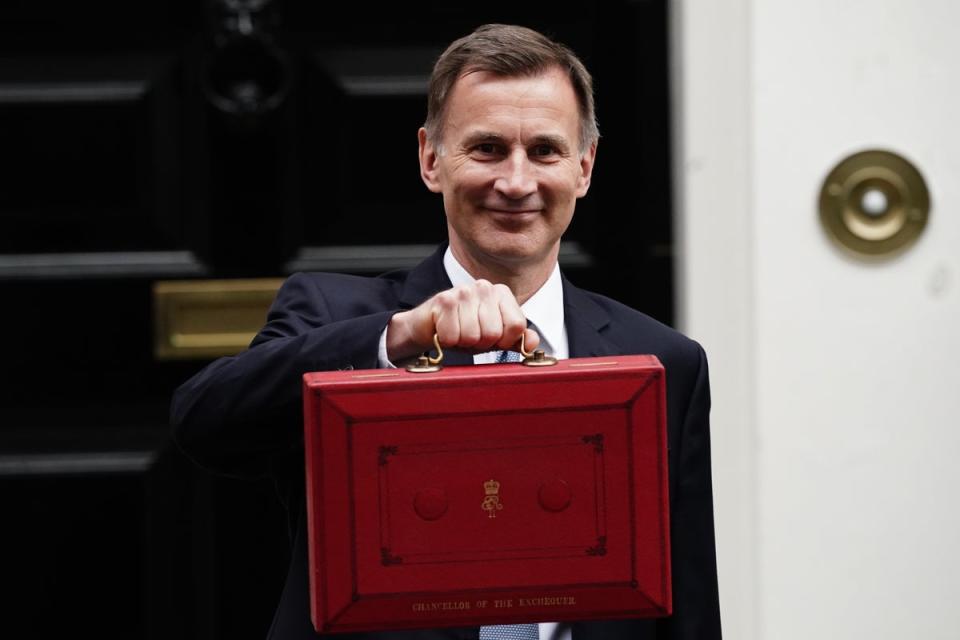Hunt rows back on tax cuts, as Bank of England warns wage inflation still too high
The chancellor has dialled down expectations about the size of the tax cuts coming in next month’s Budget, as the Bank of England offered a fresh warning that Britain’s economy was not out of the woods.
Jeremy Hunt told Tory MPs that he had far less “scope” for pre-election tax cuts than he did in November’s autumn statement beacuse of new inflation forecasts.
Andrew Bailey, governor of the Bank of England, said wages remained too high for inflation to come down “sustainably” to its 2 per cent target anytime soon, as the Bank held interest rates at a 15-year high of 5.25 per cent.
The Bank forecast that inflation is set to fall to its target of 2 per cent in the second quarter of 2024.
However, Mr Bailey said the prediction that inflation is expected to reach the all-important target in the summer is not enough for him to cut rates – saying he wanted to stress the “the degree of persistence of inflation”.

“It is not as simple as ‘inflation returns to target in the spring and job is done’,” he told reporters. “We need to see more evidence that inflation is set to fall all the way to the 2 per cent target, and stay there, before we can lower interest rates.”
Explaining that wage growth was too high, the governor said the question of pay restraint for British companies was “important”.
Economists have warned that persistent inflation problems will keep government borrowing costs higher than desired, and could leave the Treasury with less “headroom” for spending than hoped.
Mr Hunt said on Thursday that it was positive news that interest rates “appear to have peaked” – but he also warned that inflation “never falls again in a straight line – it may tick up a little bit later this month”.
The chancellor said: “The plan is working but now is not the time to junk that plan by a big spending spree, borrowing £28bn a year more as [Labour] want to do.”

The borrowing comment was a jibe at Labour’s green investment plan – but Mr Hunt is well aware that most Tory MPs would like him to go on a “spending spree” by slashing taxes next month.
The chancellor’s tone appears to have changed since the International Monetary Fund (IMF) warned earlier this week that he could not afford tax cuts. The body said it would be “very challenging” to carry out, considering the UK’s mounting debt pile and need to spend more on an ageing population.
The IMF has downgraded the UK’s growth forecast, expected to reach 0.6 per cent this year. This would make the UK economy the second-worst performer in the G7 this year.
Mr Hunt insisted that he still wants to “lighten the tax burden”, but tried to temper Tory expectations of a big pre-election giveaway.
“It does not look to me like we will have the same scope for cutting taxes in the spring Budget that we had in the autumn statement,” the chancellor told the BBC’s Political Thinking podcast.
The chancellor is said to have fiscal headroom of only £14bn, according to Treasury estimates, leaving him little room to reduce income tax or national insurance. MPs have warned that England’s councils are facing a £4bn black hole.
And the respected Institute for Fiscal Studies (IFS) think tank has said the government would need to find another £20bn to keep current levels of spending on the NHS, defence, childcare and international aid.
The IFS has warned that tax cuts are not possible without “significant” spending cuts – calling on both Labour and the Tories to be “transparent” about the difficult choices ahead.
Helen Miller, the IFS’ head of tax, told The Independent: “Talking up tax cuts means not talking honestly about the consequences to come – it’s not ideal to be saying we’ll cut taxes today and not saying how that’s going to be achieved.
“There needs to be an honest discussion about spending cuts, and which bit of the state will get smaller to make room for tax cuts. If we don’t want the state to get smaller, then we have to have tax rises.”
The Resolution Foundation’s James Smith said that “while politicians spar over tax cuts, they are ignoring the elephant in the room – namely the big spending cuts pencilled in after the next election. The public deserve to know what these planned cuts would mean for the state of public services”.
Dr George Dibb, head of IPPR’s centre for economic justice, said: “Right now, further cuts to taxes aren’t what the public want, aren’t in the interests of the wider economy, and won’t help many voters feel economically better off.”
Despite Mr Bailey’s warnings, Downing Street claimed that it was “good news” that wages have been growing faster than inflation.
Mr Sunak’s official spokesperson said wage growth was “giving households much-needed relief” and said it was “really important” that living standards were growing again.


